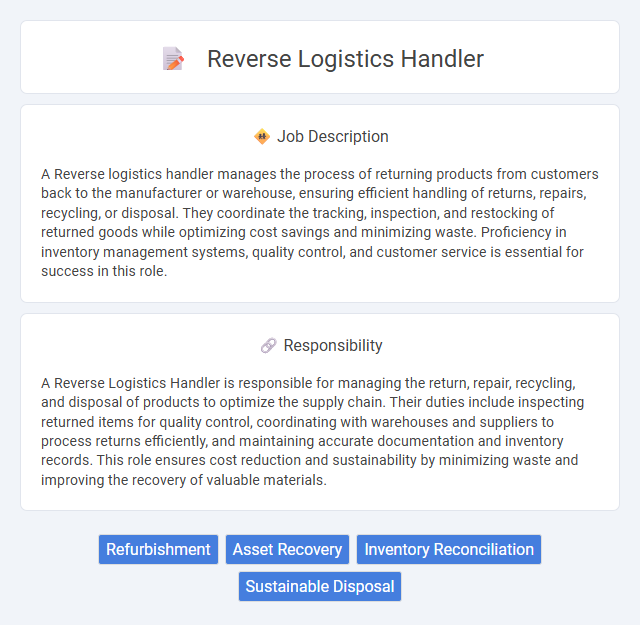
A Reverse logistics handler manages the process of returning products from customers back to the manufacturer or warehouse, ensuring efficient handling of returns, repairs, recycling, or disposal. They coordinate the tracking, inspection, and restocking of returned goods while optimizing cost savings and minimizing waste. Proficiency in inventory management systems, quality control, and customer service is essential for success in this role.
Individuals with strong problem-solving skills and attention to detail are likely suitable for a reverse logistics handler position, as the role often involves inspecting returned products for damage and coordinating their processing. Those who handle physical tasks well and can adapt to a fast-paced environment may find the job aligns with their capabilities. However, people who prefer less hands-on or highly repetitive work might struggle with the demands of this position.
Qualification
A Reverse Logistics Handler requires expertise in inventory management, product inspection, and efficient processing of returned goods to ensure accurate restocking or disposal. Proficiency with warehouse management systems (WMS), data entry accuracy, and knowledge of supply chain workflows are essential qualifications. Strong attention to detail and physical stamina are critical for managing the inspection, sorting, and transportation of returned items.
Responsibility
A Reverse Logistics Handler is responsible for managing the return, repair, recycling, and disposal of products to optimize the supply chain. Their duties include inspecting returned items for quality control, coordinating with warehouses and suppliers to process returns efficiently, and maintaining accurate documentation and inventory records. This role ensures cost reduction and sustainability by minimizing waste and improving the recovery of valuable materials.
Benefit
A Reverse Logistics Handler likely improves supply chain efficiency by managing product returns, repairs, and recycling, which can reduce overall operational costs. This role may contribute to sustainability efforts by facilitating proper disposal or refurbishment of goods. Employment in this position often offers exposure to critical aspects of inventory management and quality control, enhancing professional skills.
Challenge
Handling reverse logistics likely presents challenges such as managing complex returns processes, ensuring accurate inventory reconciliation, and coordinating efficient transportation of returned goods. The role may frequently require overcoming unpredictable product conditions and varying customer return reasons, impacting workflow efficiency. There is often a probability that technological integration and data management issues could add complexity to this position.
Career Advancement
Reverse logistics handler roles offer significant career advancement opportunities through expertise in supply chain optimization and inventory management. Professionals gain skills in returns processing, refurbishment coordination, and waste reduction, positioning them for senior roles such as logistics managers or supply chain analysts. Mastery of reverse logistics technology and sustainability practices enhances prospects for leadership positions within global distribution networks.
Key Terms
Refurbishment
A reverse logistics handler specializing in refurbishment manages the return and processing of used, damaged, or obsolete products, ensuring they are repaired, restored, or upgraded for resale or reuse. This role involves inspection, sorting, and coordinating with quality control teams to maintain product standards and optimize cost-efficiency. Expertise in handling electronics, appliances, or automotive parts enhances the value recovery and sustainability impact within the supply chain.
Asset Recovery
A Reverse Logistics Handler specializing in Asset Recovery manages the efficient retrieval, inspection, and refurbishment of returned products to maximize value recapture. Key responsibilities include coordinating transportation, assessing product condition, and ensuring compliance with environmental and company standards to optimize reuse and resale. Proficiency in inventory tracking systems and understanding of reverse supply chain dynamics are essential for minimizing waste and enhancing profitability.
Inventory Reconciliation
Reverse logistics handlers specialize in managing the return, repair, and redistribution of products to optimize supply chain efficiency. Inventory reconciliation in this role involves accurately tracking returned items, verifying quantities against records, and updating inventory systems to ensure proper stock levels. Effective reconciliation minimizes discrepancies, reduces losses, and enhances overall warehouse management in reverse logistics operations.
Sustainable Disposal
A Reverse Logistics Handler specializes in the efficient management of product returns, focusing primarily on sustainable disposal methods that minimize environmental impact. They coordinate processes such as recycling, refurbishing, and safe waste disposal to ensure compliance with environmental regulations and corporate sustainability goals. Expertise in tracking and analyzing reverse supply chain data supports the optimization of resource recovery and reduction of landfill contributions.
 kuljobs.com
kuljobs.com